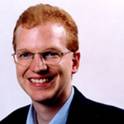Article
Rapid Hybrid Acquisition of Ultra-Wideband Signals
Journal of VLSI Signal Processing: Special Issue on Ultra-Wideband Radio
(2006)
Abstract
Impulsive ultra-wideband (UWB) radio provides many promising features for wireless communications in a dense multipath environment. However, these features are largely the result of the enormous effective processing gain, which can make acquisition difficult at the receiver. In this paper, a recently developed theory of minimum complexity sequential detection is applied to the hybrid acquisition problem. As in previous hybrid schemes, a number of potential timing phases are checked as a group; however, a phase is disregarded as soon as it appears unlikely rather than waiting for a “winner” to be chosen from the group. Another phase then replaces the disregarded one. Analysis and simulation results indicate that the proposed scheme can improve average acquisition times for highly spread systems operating over either additive white Gaussian noise (AWGN) or multipath fading channels.
Disciplines
Publication Date
April, 2006
Citation Information
Dennis Goeckel. "Rapid Hybrid Acquisition of Ultra-Wideband Signals" Journal of VLSI Signal Processing: Special Issue on Ultra-Wideband Radio Vol. 43 (2006) Available at: http://works.bepress.com/dennis_goeckel/14/
